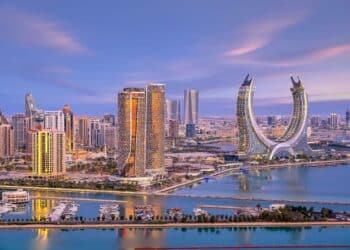Patrick Ryan reports on how the hospitality industry is incorporating robotics and artificial intelligence into hotel operations.
When you imagine how the hotel industry is going to embrace robotics, it is easy to conjure up images of a hotel lobby whirring with the sounds of machines, from the robotic receptionist behind the counter to the machines zooming up and down the halls delivering room service.
But just how realistic is that image and how far has the Middle East’s hotel industry gone to embrace technological change?
Hotel Technology Next Generation (HTNG) chief operating officer David Sjolander says the most common misconception is differentiating between artificial intelligence (AI) and robots.
“Some people would call it a robot in some instances, I am not sure I would,” he says.
“Artificial intelligence is already synonymous with the personal assistance that we have on phones with the likes of Siri and Alexa. Hotels are already experimenting in these areas but it raises significant questions of security.”
Since many voice assisted devices are always in listening mode, there is no good way to ensure data security.
“Until these products are adapted I would be very cautious. I do think we will see a lot of advances in the coming years as people get used to using these types of devices and once they get used to them they will want to use them in their hotel rooms as well,” Sjolander adds.
A similar technology is the online chat option for customer service, something that is becoming more and more common in hotels.
“These are chatbots,” says Jeroen Wisse, AccorHotels IT director.
“You think that someone is answering you but they’re not, it’s ‘something’ that is answering you.
“You get more and more of these chat options using bots.”
Radisson Blu Hotel, Dubai Waterfront and Radisson Blu Dubai Canal View, UAE cluster general manager David Allan says the key to using artificial intelligence for improving the guest experience is reasonably simple.
“It’s simply a case of offering relevant suggestions for our guests on whatever their personal preferences may be,” he says.
“From things to do, see, eat, and experience in the local area. It will help us create an environment which meets as many of their likes as possible in our hotels and making their travel easier.”
AccorHotels procurement director Shahbaz Tiavar says that if it will improve the guest experience then his company will absolutely take a look at robotics and measure the advantages against the cost.
“We can’t have a new innovation that costs five times what we are spending today just for the sake of it,” he says.
“We are definitely keen to try new machines but we are not sure it will work to be honest. Some customers might find it fantastic while others might prefer to have human interaction. This is the Middle East, a region where people expect to have a higher service than other regions and, by higher service, they often mean someone.”
The front of house is where robotics have been most prominent to enhance the experience for guests arriving at a hotel.
“So far robotics have been used at the front of house for the guest engagement aspect, there is an element though of the hotel industry being worried that robots will take away from the human element,” says Sjolander.
“It is very early days and we are just really witnessing the first attempts.”
Wisse, AccorHotels, warns that people will not simply settle for any old gimmick.
“Is it really something that makes the people feel more welcome? We are in the hospitality industry and need that personal interaction,” he says.
“There are hotel companies that do certain things for the sake of it, this is something that our CEO talked about recently saying ‘it’s good to do something, but when you do it make sure you don’t lose that touch with the guests’.”
Allan, Radisson Blu, gives a straight answer when he’s quizzed if the industry has shown a reluctance to embrace artificial intelligence.
“Yes, of course it has,” he says. “Couple that with hospitality generally being an industry that’s always more than a little behind the curve of implementing technology as a rule, then AI will be some way off.
“To be frank, I’ve yet to have a guest enquire about AI. There is definitely an appeal to some, more those of a technology-embracing perspective, and this shouldn’t be ignored. However, it is people and their personalities that still contribute to the best hotels in the world being at the top of their game.”
He says the challenge is to balance the personal with the artificial which will involve a significant financial investment as well as time and input from staff and guests.
It’s all very well having the ability to use robotics or artificial intelligence but you have to ask yourself where and when it’s appropriate.
“The one thing a machine can never do without some sort of historical data is predict an outcome,” says AccorHotels’ Wisse.
“That’s where us humans come in as emotion plays a part. We tend to make purely emotional decisions, based on instinct. A machine can tell you that you’ve got such and such an ailment and you will die within 24 hours, whereas a human can tell you more sensitively.”
He gives an example of how a robot would deal with guests who were partying too loud and annoying other guests.
“A robot would simply turn off the power to the music,” he says.
“And even if it contacted the police, why would it be doing that? Because it’s still relying on humans to solve the problem.”
It’s easy to watch science fiction films involving robots and get carried away about the possibilities, but Wisse reckons they serve a purpose.
“Movies like ‘Artificial Intelligence’ slowly introduce us to the idea this is coming. Of course they make it scary and you think you have to be wary,” he says.
“Yes it helps make people slowly but surely aware machines are going to come and you will have to talk to them but we’re already doing that.”
Wisse talks about a recent conversation he had regarding the use of a new kind of robot.
“We were asked here in the Middle East to try a new robot that can do room service without a human being involved,” he says.
“The idea of the robot is that it will go by itself in the corridor, take the elevator alone, the robot can drive the elevator to where it wants to go, when it arrives at the room it rings the room to say ‘I’m here’. The guest opens the door then to the robot. It’s been used in the US and they asked us to use it in Dubai.”
Radisson Blu’s Allan say it is more a case of the industry keeping an eye on robots and artificial intelligence rather than embracing them.
“Our primary focus is our guests and providing meaningful moments and experiences to them and our team,” says Allan.
One unlikely area where robots can make a difference to hospitality, says AccorHotels’ Tiavar is when a guest visits a hotel spa.
“A lot of people go and don’t actually know what treatment their body needs,” he says.
“A robot can scan your body and tell you exactly what you need. It could say ‘you have a pain here or a pain there’. Then the therapist can adapt the treatment for you.
“There are a lot of areas that have not been explored and we are only at the beginning of it.”
While AI and robotics have been used mostly in front of house to date, it’s at the back of the house where there is more scope for its adoption, according to Sjolander, HTNG.
“Going forward you’re going to see more and more things like a robotic dish washing system,” he says.
It’s a belief that’s shared by AccorHotels’ Tiavar.
“We are looking for more productivity, people are looking for new ways of cleaning and optimising time,” he says.
“In housekeeping we see a lot of improvement, many new companies are coming into the cleaning industry bringing automation and artificial intelligence. Definitely artificial intelligence will help create better efficiency for sure. It’s not the only area we see artificial intelligence coming but it will be the next.”
Wisse says that swimming pools are another area where artificial intelligence is being used. “Like that automatic vacuum cleaner that has sensors, you have the same thing for swimming pools now,” he says.
“There are great opportunities and more valid opportunities at the back of the house. Look at procurement, storing, finances and you could use the time saved for the qualified staff to have much more quality interaction with the guests.”
Sjolander, HTNG, said that while the full implementation of robots in the industry is inevitable, the question that remains is, ‘where?’.
“I think there is the demand for a robot-run hotel but it may not be that strong in the Middle East,” he says.
“It could work though for hotels that only want to have one or two staff in the building and don’t want to leave the front desk in the middle of the night. While it may not be the case with every hotel, I can certainly see some demand for that.”
So what exactly does the future hold for robots within the hotel industry?
Allan, Radisson Blu, isn’t convinced about how far robots will be integrated into the industry and can’t see a time when his company will have a hotel fully staffed by robots.
“For our company, no, it’ll never happen,” he says.
“Whilst I can wholly see that attraction and novelty of the idea to some, hotels remain a very personal choice for most. We as humans, are naturally attracted to each other and being in or around each other’s company. Until they design a robot that can smile and lift someone’s mood instantly, I think we’re safe.”
That said, Allan admits that artificial intelligence will become more prevalent in the industry over the coming years.
“The key will be perfecting a way to use AI to improve what we offer our guests while embellishing the human and personal touch at the same time,” he says.
“It’s not a complicated business; recruit nice people, look after them and they’ll be nice to your guests. Simple.”
Sjolander, HTNG, says: It’s very, very early but if you look 10 years ahead you will see more hotels using robotics but the thing is what is being used in 10 years’ time will be nothing like what’s being used today.”
And so, while robots may become a regular feature in hotels, it will be alongside humans, not in place of them.



































































